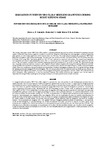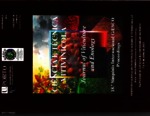Use este identificador para citar ou linkar para este item:
http://www.alice.cnptia.embrapa.br/alice/handle/doc/978882Registro completo de metadados
| Campo DC | Valor | Idioma |
|---|---|---|
| dc.contributor.author | CONCEIÇÃO, M. A. F. | pt_BR |
| dc.contributor.author | ZEOLI, J. de J. S. | pt_BR |
| dc.contributor.author | PAULA, M. V. B de | pt_BR |
| dc.date.accessioned | 2016-02-23T06:50:35Z | - |
| dc.date.available | 2016-02-23T06:50:35Z | - |
| dc.date.created | 2014-02-06 | pt_BR |
| dc.date.issued | 2013 | pt_BR |
| dc.identifier.citation | Ciência e Técnica Vitivinícola, Porto, v. 28, t. 2, p. 167-170, 2013. Número especial. | pt_BR |
| dc.identifier.uri | http://www.alice.cnptia.embrapa.br/alice/handle/doc/978882 | pt_BR |
| dc.description | The seedless table grape cultivar 'BRS Clara' (Vitis vinifera L.) presents yellowish-green berries and was developed for growing in tropical regions. In Brazilian tropical areas irrigation is usually an essential tool. Irrigation cutoff during berry ripening stage is sometimes adopted by grape growers to reduce water application and to increase water use efficiency. This study aimed to evaluate the response of 'BRS Clara' grapevines to irrigation cutoff during ripening stage. The experiment was carried out in Jales, SP, Brazil (20º16'S, 50º33'W, 483m), from June to October 2010, using ?BRS Clara? plants grafted on ?IAC-572? and conducted in a overhead trellis system. The vineyard was irrigated by microsprinklers and covered with polyethylene screen, that is a common practice in the region to protect the grapes against bat and bird attacks. The soil moisture conditions were monitored employing tensiometers installed at 15 cm and 45 cm deep. The experimental design was completely randomized with two treatments, with irrigation (CI) and without irrigation (SI) during fruit ripening. Production and fruit quality variables were evaluated including berry and bunch mass, yield per plant, diameter and length of berries, soluble solids and titratable acidity. There was no difference between treatments for all parameters evaluated. In irrigation treatment (CI) it was applied 41.9 mm during the ripening period, representing 16.1% of total irrigation. The soil water potential in the CI treatment stayed near field capacity, whereas the treatment without irrigation (SI) showed a decrease trend during part of the period, reaching values closed to 70kPa. This reduction did not affect subsequent culture performance. It must be considered, however, that rainfall occurrence was registered since the last week of September and during October, rewetting the soil and approaching the soil water potential values in both treatments. | pt_BR |
| dc.language.iso | eng | eng |
| dc.rights | openAccess | eng |
| dc.subject | Uva de mesa | pt_BR |
| dc.subject | BRS Clara | pt_BR |
| dc.subject | São Paulo | pt_BR |
| dc.subject | Uvas do Brasil | pt_BR |
| dc.title | Irrigation cutoff on 'BRS Clara' seedless grapevines during berry ripening stage. | pt_BR |
| dc.type | Artigo de periódico | pt_BR |
| dc.date.updated | 2018-01-23T11:11:11Z | pt_BR |
| dc.subject.thesagro | Viticultura | pt_BR |
| dc.subject.thesagro | Uva | pt_BR |
| dc.subject.thesagro | Irrigação | pt_BR |
| dc.subject.thesagro | Evapotranspiração | pt_BR |
| dc.description.notes | Resumo expandido apresentado no 18º Simpósio Internacional GiESCO, 7 a 11 de julho de 2013, Porto. | pt_BR |
| riaa.ainfo.id | 978882 | pt_BR |
| riaa.ainfo.lastupdate | 2018-01-23 -02:00:00 | pt_BR |
| dc.contributor.institution | MARCO ANTONIO FONSECA CONCEICAO, CNPUV; Jéssica de J. S. Zeoli, São Paulo State Technological College; Marcos V. B. de Paula, São Paulo State Technological College. | pt_BR |
| Aparece nas coleções: | Artigo em periódico indexado (CNPUV)  | |
Arquivos associados a este item:
| Arquivo | Descrição | Tamanho | Formato | |
|---|---|---|---|---|
| CONCEICAOGIESCO2013.pdf | 210,79 kB | Adobe PDF |  Visualizar/Abrir | |
| GiESCOcapaanais072013.pdf | 718,33 kB | Adobe PDF |  Visualizar/Abrir |









